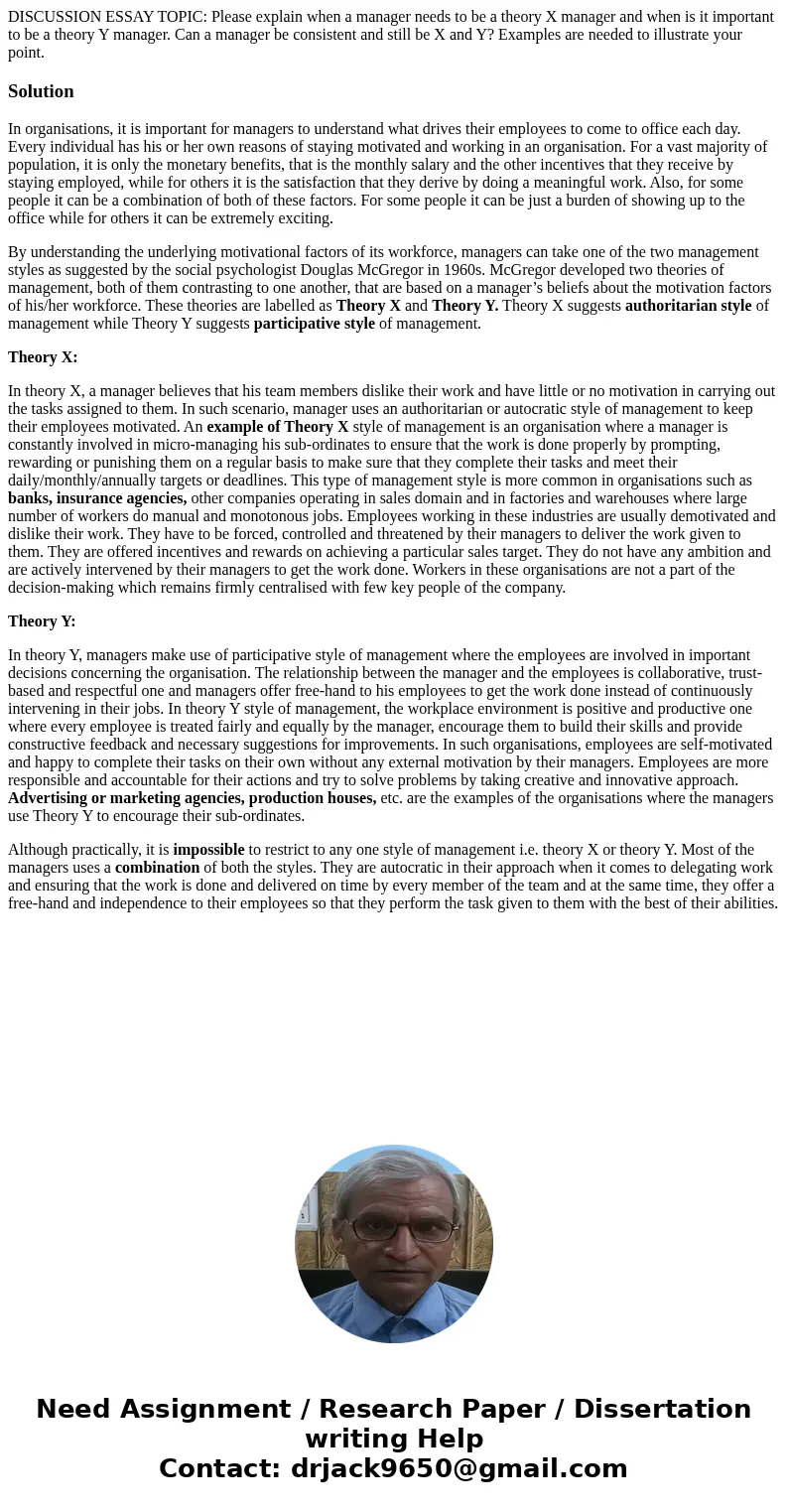DISCUSSION ESSAY TOPIC Please explain when a manager needs t
DISCUSSION ESSAY TOPIC: Please explain when a manager needs to be a theory X manager and when is it important to be a theory Y manager. Can a manager be consistent and still be X and Y? Examples are needed to illustrate your point.
Solution
In organisations, it is important for managers to understand what drives their employees to come to office each day. Every individual has his or her own reasons of staying motivated and working in an organisation. For a vast majority of population, it is only the monetary benefits, that is the monthly salary and the other incentives that they receive by staying employed, while for others it is the satisfaction that they derive by doing a meaningful work. Also, for some people it can be a combination of both of these factors. For some people it can be just a burden of showing up to the office while for others it can be extremely exciting.
By understanding the underlying motivational factors of its workforce, managers can take one of the two management styles as suggested by the social psychologist Douglas McGregor in 1960s. McGregor developed two theories of management, both of them contrasting to one another, that are based on a manager’s beliefs about the motivation factors of his/her workforce. These theories are labelled as Theory X and Theory Y. Theory X suggests authoritarian style of management while Theory Y suggests participative style of management.
Theory X:
In theory X, a manager believes that his team members dislike their work and have little or no motivation in carrying out the tasks assigned to them. In such scenario, manager uses an authoritarian or autocratic style of management to keep their employees motivated. An example of Theory X style of management is an organisation where a manager is constantly involved in micro-managing his sub-ordinates to ensure that the work is done properly by prompting, rewarding or punishing them on a regular basis to make sure that they complete their tasks and meet their daily/monthly/annually targets or deadlines. This type of management style is more common in organisations such as banks, insurance agencies, other companies operating in sales domain and in factories and warehouses where large number of workers do manual and monotonous jobs. Employees working in these industries are usually demotivated and dislike their work. They have to be forced, controlled and threatened by their managers to deliver the work given to them. They are offered incentives and rewards on achieving a particular sales target. They do not have any ambition and are actively intervened by their managers to get the work done. Workers in these organisations are not a part of the decision-making which remains firmly centralised with few key people of the company.
Theory Y:
In theory Y, managers make use of participative style of management where the employees are involved in important decisions concerning the organisation. The relationship between the manager and the employees is collaborative, trust-based and respectful one and managers offer free-hand to his employees to get the work done instead of continuously intervening in their jobs. In theory Y style of management, the workplace environment is positive and productive one where every employee is treated fairly and equally by the manager, encourage them to build their skills and provide constructive feedback and necessary suggestions for improvements. In such organisations, employees are self-motivated and happy to complete their tasks on their own without any external motivation by their managers. Employees are more responsible and accountable for their actions and try to solve problems by taking creative and innovative approach. Advertising or marketing agencies, production houses, etc. are the examples of the organisations where the managers use Theory Y to encourage their sub-ordinates.
Although practically, it is impossible to restrict to any one style of management i.e. theory X or theory Y. Most of the managers uses a combination of both the styles. They are autocratic in their approach when it comes to delegating work and ensuring that the work is done and delivered on time by every member of the team and at the same time, they offer a free-hand and independence to their employees so that they perform the task given to them with the best of their abilities.

 Homework Sourse
Homework Sourse